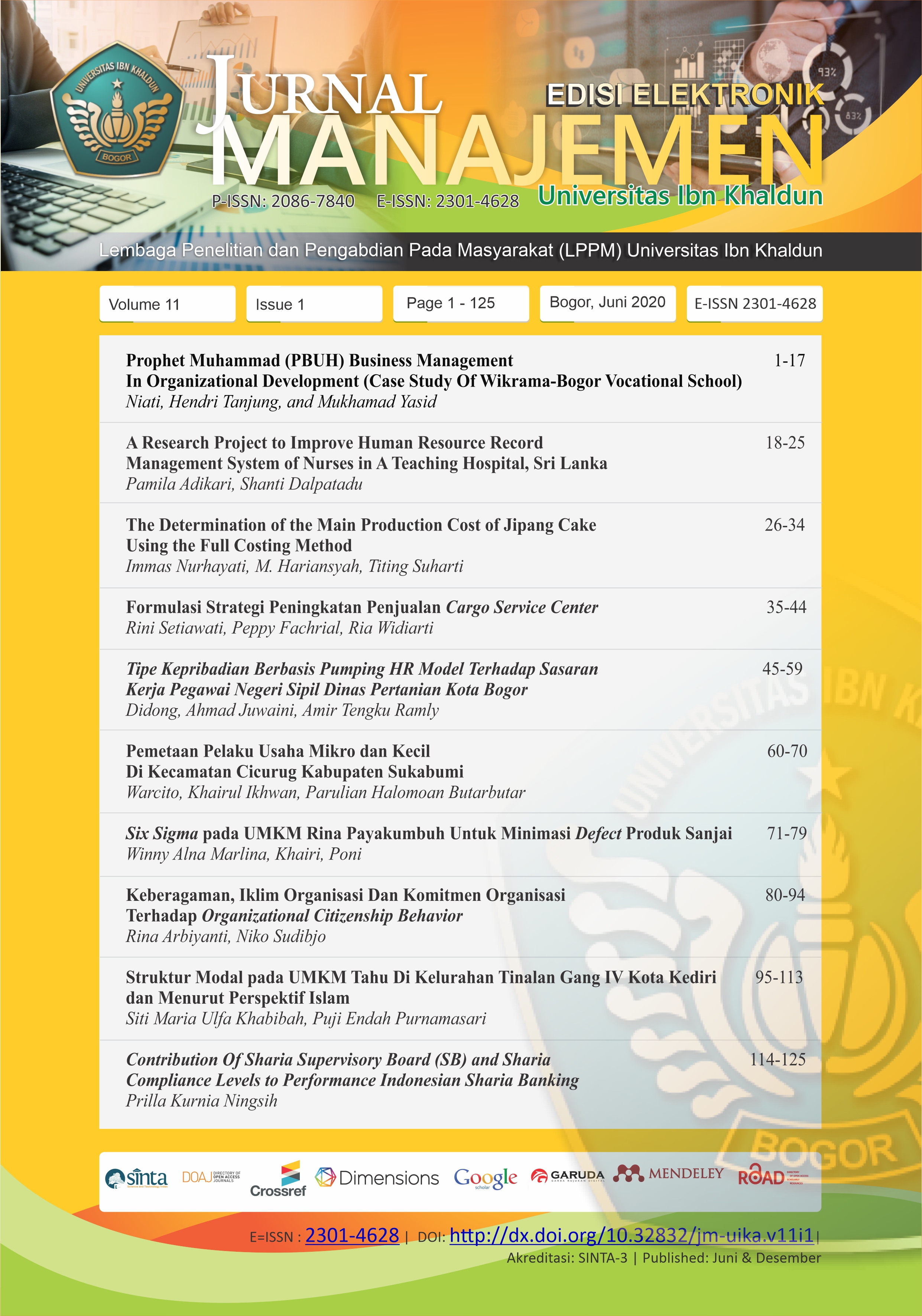Tipe Kepribadian Berbasis Pumping HR Model Terhadap Sasaran Kerja Pegawai Negeri Sipil Dinas Pertanian Kota Bogor
DOI:
https://doi.org/10.32832/jm-uika.v11i1.3025Keywords:
Attitude, ANOVA, BNT, Personality, Regression, SKPAbstract
Good governance is a set of processes that are implemented in an organization to make a decision. Human self can not be separated from the so-called personality. Personality is a dynamic organization of individual psycho-physical systems. Personality determines individual behaviour and thinking in a unique way. Personality is the best factor to be used to predict employee performance. Civil Servants (PNS) who have introverted and extroverted personalities can influence performance. The measured performance consists of Employee Work Objectives (SKP) and Attitude. This study aims to examine the effect of personality on SKP and Attitude. The method used is the ANOVA, BNT and dummy regression tests. The sample was measured by 40 non-random sampling techniques. The results showed that the Extrovert = introvert personality type gives a greater influence on SKP. Extrovert = introvert personality type has a greater influence on Attitude. There is a significant difference between personality types with SKP. There is a significant difference between personality types with Attitude. Extrovert = Introvert personality type produces the best average of work performance (SKP and Attitude). Whereas Extrovert personality types produce the lowest average on work performance (SKP and Attitude) of Civil Servants, Bogor Agriculture Department. To produce good work performance in an SKPD (Regional Work Unit), it is preferred to place extrovert = introvert personality types, especially in important positions.
References
Alwisol. 2009. Psikologi Kepribadian. Malang: UMM Press.
Kreitner, R. and Angelo,K. (2001).Organizational Behavior. Irwin McGraw Hill. Fifth edition.
Naisaban, Ladislaus (2005). Psikologi Jung: Tipe Kepribadian Manusia dan Rahasia Sukses Dalam Hidup (tipe kebijaksanaan Jung). Jakarta: PT Gramedia.
Peraturan Pemerintah Nomor 46/2011 tentang Penilaian Prestasi Kerja PNS dan Perka BKN Nomor 1/2013 tentang Ketentuan Pelaksanaan PP Nomor 46/2011 tentang Penilaian Prestasi Kerja PNS.
Ramly, A. T. (2005). Pumping Talent Memahami Diri, Memompa Bakat. Jakarta: Kawan Pustaka.
Ramly, A. T. (2019). Evaluation of Pumping HR (Human Resources) Model-Based Training Program on Human Resources Development at Bogor Agricultural University (IPB). Integrated Journal of Business and Economics, 3(2), 153-163.
Ramly, A. T., & Suherbi, D. (2020). Personality Type Based Pumping-HR Model Toward Working Targets of The Civil Service. Jurnal Manajemen, 24(1), 109-123.
Suryabrata, (2015). Psikologi Kepribadian Edisi Ke-1. Jakarta: Rajawali Pers.
Suryabrata, Sumadi.(2003).Psikologi Kepribadian.Jakarta: PT Raja Grafindo Persada.
LAN (2017). Tata Laksana Pemerintahan Yang Baik dari Wikipedia Bahasa Indonesia, ensiklopedia bebas 25 Maret 2017. Jakarta: LAN
Wardiana,U, (2004). Psikologi Umum, Bandung: Pustaka Setia.
Downloads
Published
How to Cite
Issue
Section
License
Copyright (c) 2020 Jurnal Manajemen (Edisi Elektronik)

This work is licensed under a Creative Commons Attribution-NonCommercial 4.0 International License.
Authors who publish with this journal agree to the following terms:
- Authors retain copyright and grant the journal right of first publication with the work simultaneously licensed under a Creative Commons Attribution-NonCommercial-ShareAlike 4.0 International License that allows others to share the work with an acknowledgement of the work's authorship and initial publication in this journal.
- Authors can enter into separate, additional contractual arrangements for the non-exclusive distribution of the journal's published version of the work (e.g., post it to an institutional repository or publish it in a book), with an acknowledgement of its initial publication in this journal.
- Authors are permitted and encouraged to post their work online (e.g., in institutional repositories or on their website) prior to and during the submission process, as it can lead to productive exchanges, as well as earlier and greater citation of published work (See The Effect of Open Access).











